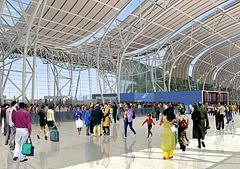
Chennai, April 26: It was a torturous homecoming for P Periaswamy, a resident of Karkudi village in Perambalur district, who was enslaved by his employer in Saudi Arabia for 18 years. When the 45-year-old finally landed in Chennai on Wednesday morning, the airport police detained him for a couple of hours suspecting him to be the husband of a deserted woman.
Periasamy, who went to Saudi Arabia almost two decades ago, was employed as a shepherd. His employer neither paid him salary nor allowed him to return home. Periaswamy was rescued after a Saudi citizen reported to the police there about his plight. The Saudi government ordered his employer to pay the dues and get him an air ticket to go home.
But when Periaswamy set foot on Indian soil on Wednesday, he was taken to the airport police station. The reason: A woman from Perambalur had complained that her husband had left for Saudi Arabia 12 years ago and had never kept in touch with the family. Police thought Periaswamy could be the person. Finally, the woman's brothers came from Perambalur to identify Periaswamy. They told the police this was not the man who married their sister. Periaswamy walked free, but there are hundreds more of Indians stranded in the Gulf, unable to return home.
It was an emotional reunion for Periaswamy with his brother Kannappa, who had come to the airport. "I could not recognize my elder brother. After showing him old photographs, we hugged each other and cried. We thank the Indian diplomats and Saudi officials for helping him return home. We don't know the whereabouts of his wife as she left a year after he left for Saudi Arabia," Kannappa said.
A sobbing Periaswamy said: "I feel so happy to be back home with family. I've been through hell and no Indian should suffer my fate. I was a slave at the hands of my employer who used to beat me up. My future is uncertain. I will decide what to do after a few days. Please don't trust agents who promise jobs in Saudi."
S D Moorthy, consul (labour & community welfare) at the Indian consulate in Jeddah, told TOI over telephone on Wednesday, "It's a sad case where Periaswamy did not even have access to a telephone to get in touch with someone to rescue him. He was not paid his salary and was given just a meal a day. It was slavery."
Moorthy said Periaswamy, who was rescued more than ten days ago, had been under the care of the Indian Consulate in Jeddah. He said Periaswamy had forgotten Tamil as he had spoken in the langauge for almost two decades.
Periaswamy went to work as a shepherd in the Hail region of Saudi Arabia in 1994. He was married for one year when he reached the Kingdom. Moorthy said Periaswamy tried to commit suicide once out of frustration.





Comments
Add new comment